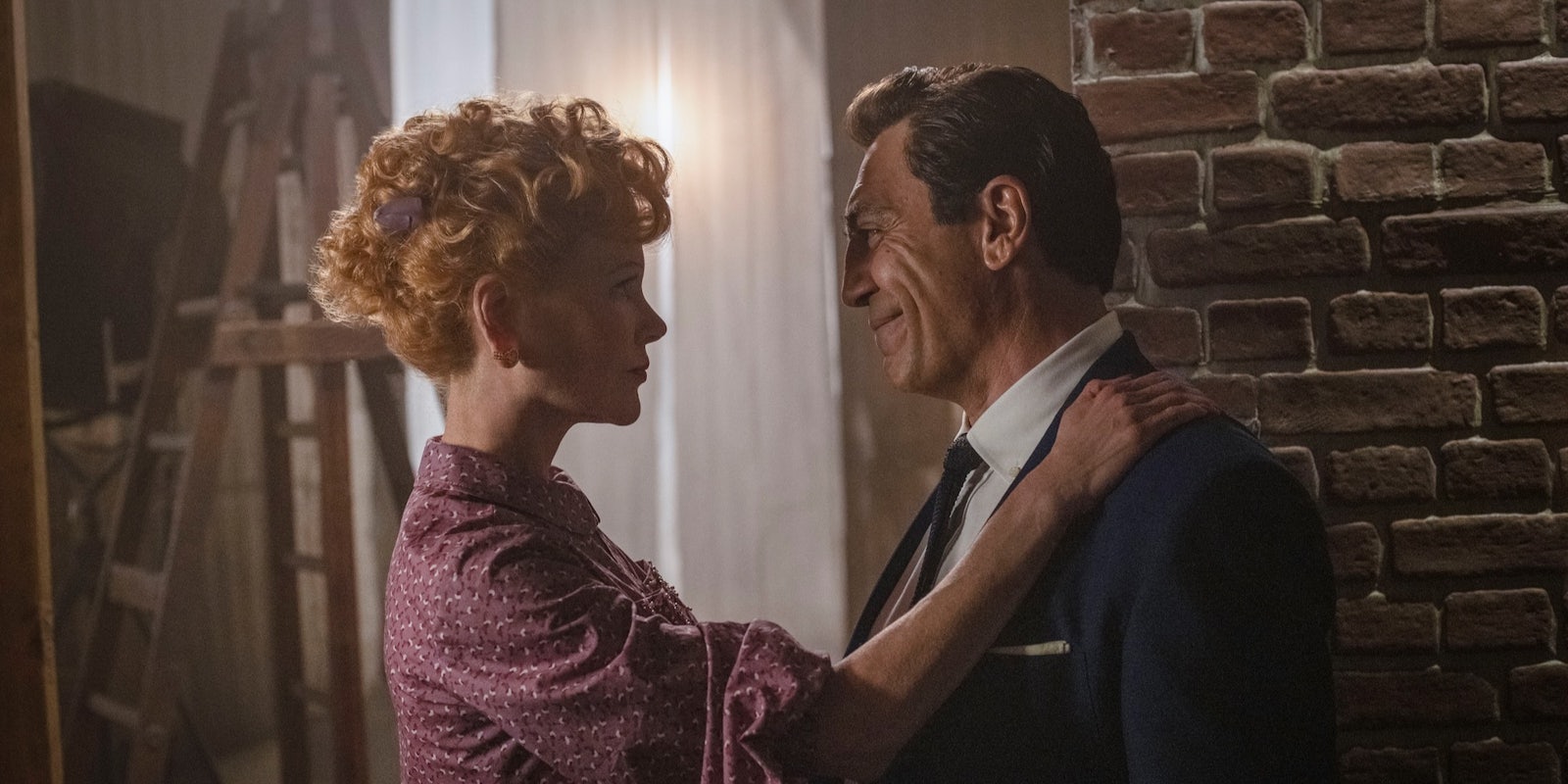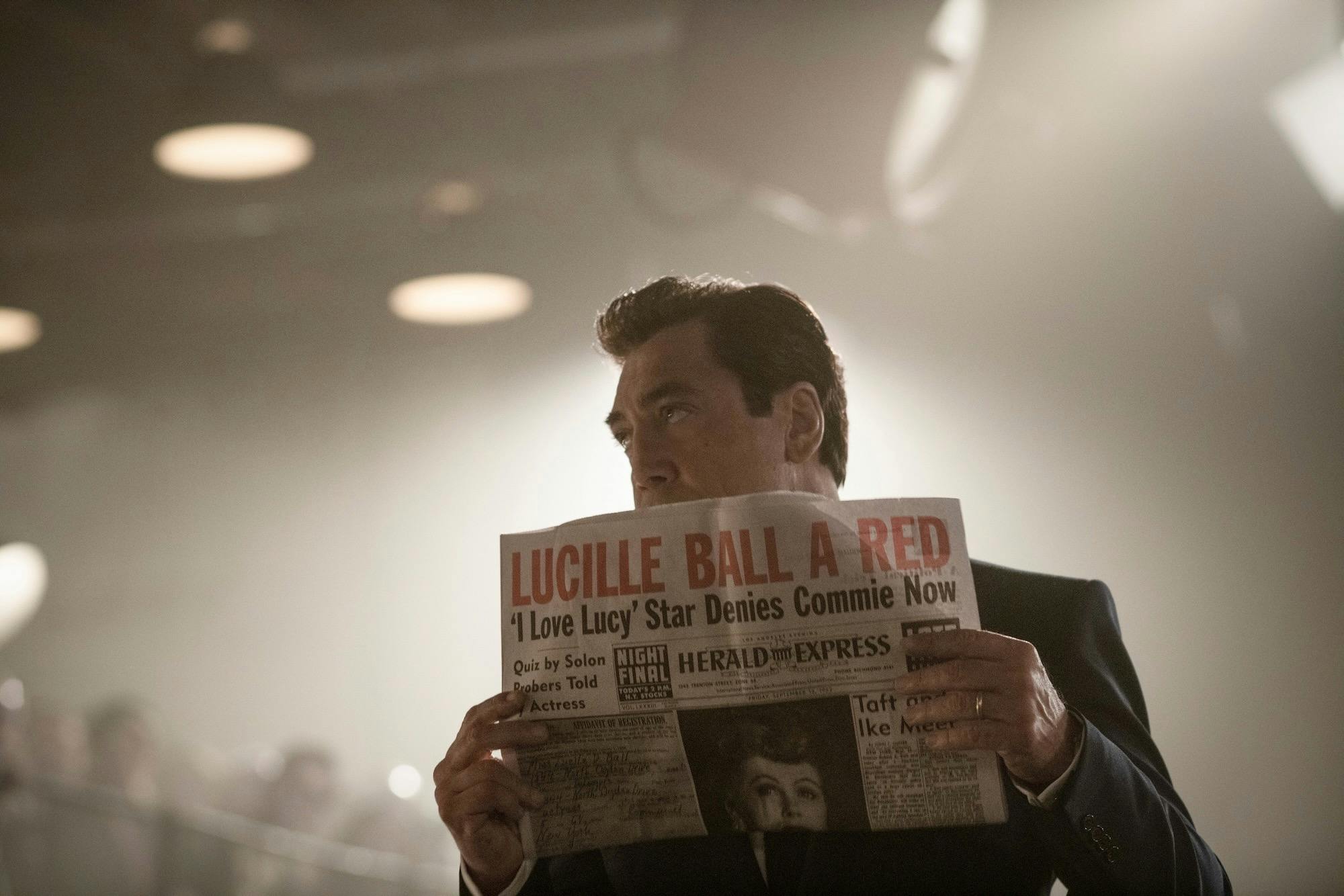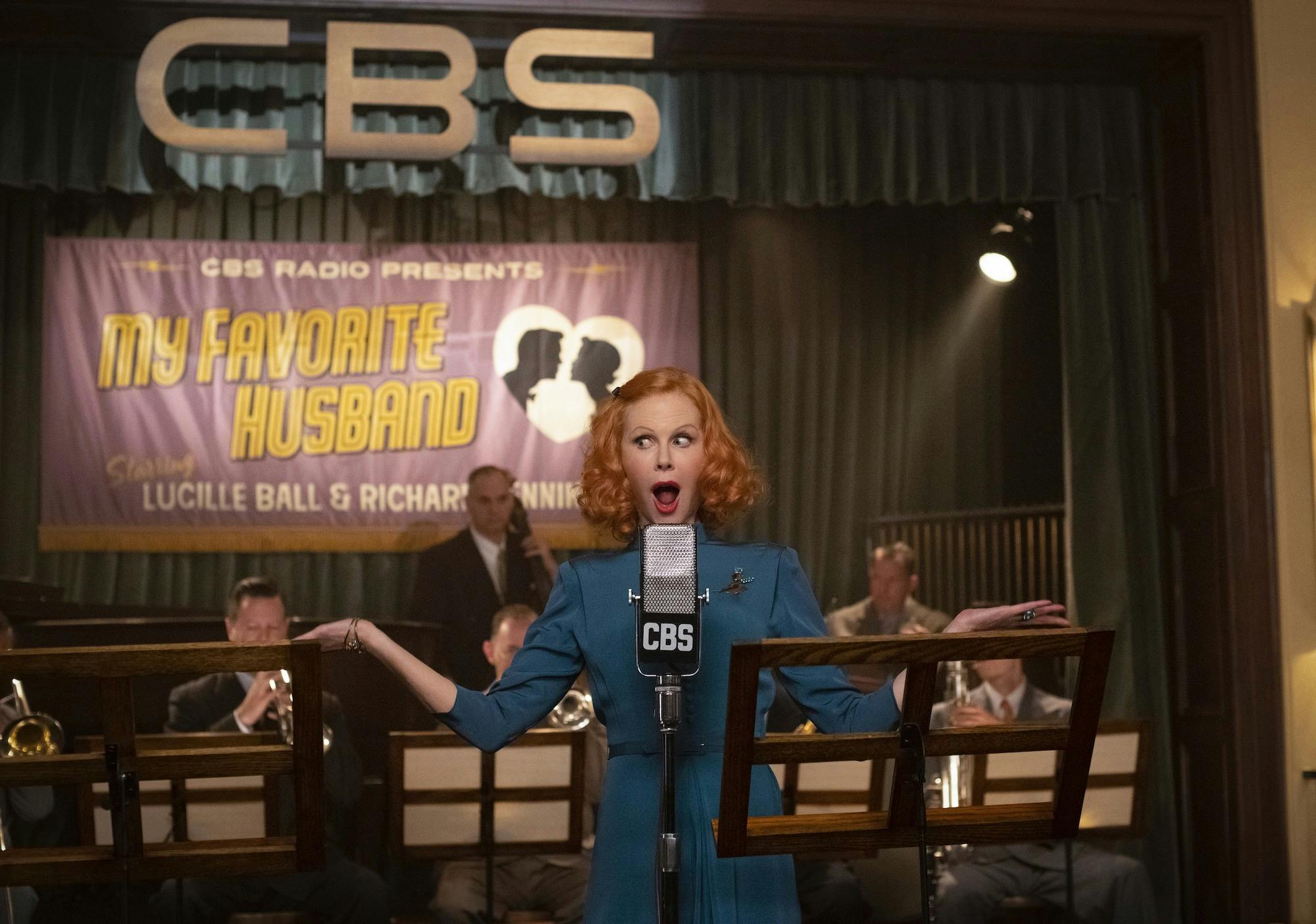Being the Ricardos wants to be a lot of things. The newest film from writer-director Aaron Sorkin (The Trial of the Chicago 7) plays out over a highly eventful week during the production of I Love Lucy in 1953, the events of which would need far more than a single episode to convey. It tries to encompass elements of a more traditional biopic as Lucille Ball (Nicole Kidman) weathers two scandals—one that could tank her career, the other her marriage—as well as another development that’ll throw a major wrench into the show. It wants to recreate certain scenes from I Love Lucy shot-for-shot, and for some reason, the film is framed with a fake documentary in which several key players during this week are interviewed by an unknown person behind the camera. Some of those devices are far more successful than others.

DIRECTOR: Aaron Sorkin
STREAMING: Amazon Prime Video
Set during a particularly tumultuous week of ‘I Love Lucy,’ Lucille Ball has to navigate how to deal with possibly being named a communist, a scandalous gossip item about her husband’s alleged infidelity, and an even bigger life-changing event that could derail her show. The lead performances are solid (even if they can’t escape the shadows of their real-lfe counterparts), but it tries to tackle too much, the framing device doesn’t really work, and some script choices by Aaron Sorkin in the final act derail any momentum the film had going.
All of this is interlaced with Sorkin’s trademark, and at times, exhaustive brisk dialogue and pacing; it can barely convey one thought before moving on to the next one, and while that might work in conveying some scenes such as the actual day-to-day of making a sitcom in the ’50s, it’s less effective when you throw all of the narrative devices into the mix. Being the Ricardos has a decent cast on its side who manage to improve upon some weak points in Sorkin’s script, but it can’t solve all of the film’s problems: It’s juggling too many plot points, wants to be too many things, and a plot choice in the final act undermines the entire movie.
The first scandal is the biggest, one that threatens to derail I Love Lucy: Walter Winchell, a right-wing radio host, claimed that Lucille Ball had registered as a Communist on a 1936 voting ballot. During the Red Scare and the rise of the Hollywood Blacklist, any association with Communism and the Communist Party, no matter how minimal, had the potential to end someone’s career, so even though the House Un-American Activities Committee (HUAC) cleared Lucille, who claimed she checked the box as a way to honor her grandfather, it could still end her career along with every other cast and crew member of I Love Lucy. But because it hadn’t spread beyond Winchell’s broadcast, whether or not I Love Lucy was canceled was still up in the air. “If you tape a show Friday night, it means you still have a show,” the CBS exec Howard Wenke (Clark Gregg) explained.
If that wasn’t enough, Lucille was also dealing with the fallout of a Confidential story alleging infidelity from her husband Desi Arnaz (Javier Bardem), a story she seemed to be more obsessed with than a nearly 20-year-old voting ballot potentially derailing her career. Lucille was also newly pregnant and she and Desi wanted to include it in the show, a major taboo in television at the time because; male writers and execs worried that a pregnant body would lead viewers to wonder “how did that happen.” (Yes, a bunch of men trying to explain all of this to Lucille is as cringe as you’d expect.) Oh, and they had a new episode to shoot in five days and Lucille wasn’t satisfied with the direction that the episode’s direction was going.
Most Hollywood biopics aren’t completely accurate; they often take artistic liberties with history to ramp up the drama or to condense events. For Being the Ricardos, it’s largely the latter. The Confidential story at the center of Being the Ricardos won’t be published until 1955, Lucille and Desi’s son was born in January 1953 while accusations that Lucille Ball was a communist wouldn’t happen until later that year, and the episode at the center of I Love Lucy, “Fred and Ethel Fight,” had already aired in 1952. Any of those plots could lend itself to a movie, but here, all of those events converge within the same week in 1953. It was the peak of I Love Lucy’s popularity, and that all fell during what one character, via the fake documentary format that Being the Ricardos uses and mostly exists as an exposition tool, described as a “tough week.”
In-between all of that, Being the Ricardos also has its sights set on the bigger picture. It takes us through the course of Lucille and Desi’s relationship, Lucille’s struggles to make it in Hollywood as a movie star, and Desi’s struggles as a Cuban entertainer in a racist industry. We’re thrust into the sometimes fraught environment within I Love Lucy, particularly the friction between co-stars William Frawley (J.K. Simmons) and Vivian Vance (Nina Arianda) and Vivian’s struggles being made to play a frumpy character and attempts by writer Madelyn Pugh (Alia Shawkat) to make Lucy Ricardo be more than the butt of the joke in a male-dominated industry. Lucille is more pragmatic about using the jokes that work, so she doesn’t mind playing an idiot, but she objects to that framing more when Desi tries to spin the voting ballot as something she did by mistake. And the film tries to highlight some of Desi’s contributions to making I Love Lucy such a hit behind the scenes.
The big controversy around Being the Ricardos is on its casting, both elements of which Sorkin managed to highlight within the film (although it’s unclear how much he meant to). Many people objected to Kidman playing Lucille Ball because she didn’t look enough like Lucille Ball, and while she offers nuance as Lucille while willing to play over the top, she struggles more when Being the Ricardos attempts to faithfully recreate shots from I Love Lucy. When those scenes occur, the film goes from color to black-and-white as those scenes are brought to life by the actors.
The problem with that approach, while clever on paper, is that I Love Lucy was so beloved and such a staple for generations of viewers (both original viewers and the people who watched reruns on TV Land and Nick At Nite) that we can instantly compare the two and nitpick over the recreation. I am the first to admit I’m not a fan of biopics relying solely on how much an actor can physically transform into looking like the real-life person they’re playing and hoping the performance comes in later—hello Bohemian Rhapsody—but the recreations beg for the comparisons between Kidman and the real-life Ball to come in, and the more famous the actor is, the more it stands out in a bad way; here, imitation is not the sincerest form of flattery.
(One saving grace of Being the Ricardos is that we’re not made to watch Sorkin and company attempt to recreate Vitameatavegamin or Lucy and Ethel in the chocolate factory; even Sorkin seems to know that would be a step too far.)
Bardem’s casting also proved to be controversial because Desi Arnaz, who was Cuban, was being portrayed by a Spanish actor instead of having a Latinx actor portray the character, particularly when Desi’s Cuban ancestry is so tied to his identity and Hispanic and Latinx actors are still massively underrepresented in Hollywood. Attempts by Sorkin and Bardem to defend or explain the casting in recent weeks fueled another wave of backlash. The decision is even more of a slight when Being the Ricardos features a scene in which CBS executives call Desi Spanish as they try to explain to Lucille why he can’t play her husband on TV and Lucille corrects them by noting that Desi is Cuban.
Kidman and Bardem play well off each other, but it’s the supporting cast of Simmons, Arianda, and even Shawkat in her limited screentime, who truly shine and make even the weaker aspects of Sorkin’s script work. But, like Chicago 7, Sorkin also heavily relies on sentimentalism with events that may not have happened to sell its emotional climax. In Being the Ricardos’ case, it also seems primed to try to rehabilitate the image of a man whose crimes against Americans through the agency he ran are still coming to light decades after they occurred. And like a bad joke, it falls flat.
Being the Ricardos is now in theaters and streaming on Amazon Prime Video.




